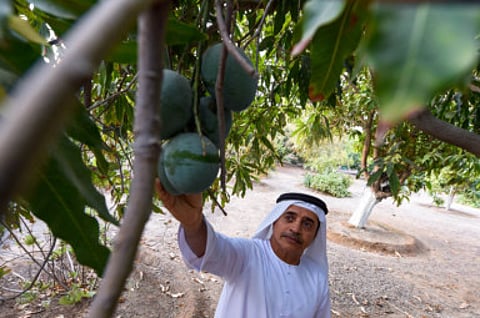Mangoes find a home in Fujairah
Mango plantations in Fujairah bear fruit with the emirate producing Dh13.4m worth of mangoes last year

Fujairah: Nestled amid the rugged Hajar mountains of Fujairah are some rare patches of green that are producing a wide variety of mangoes.
The emirate of Fujairah is known for its mountains and wadis, natural springs and sandy beaches, but little is known about its expanding acres of plantations, growing mangoes as well as other fruits that one won’t usually associate with an arid country.
Though, other fruits like papayas, bananas and oranges also grow in the rapidly expanding orchards of Fujairah, it is the king of fruits that seems to have found a new home in the Northern Emirates, with the fruit also growing in Ras Al Khaimah.
Watch: At the heart of Al Hefeiti’s plantation efforts are mangoes, with more than 20 varieties growing at his farm as well as at other farms across Fujairah and Ras Al Khaimah.
Mangoes are so widely grown in Fujairah now that the emirate has become the biggest producer of the fruit in the region and the second biggest crop of the emirate after dates.
According to Fujairah Statistics Centre, fruit production in the emirate rose to 42,061 tonnes in 2017, compared to 34,408 tonnes in 2016, registering a rise of 22 per cent.
I love working with plants. I see a lot of agricultural potential in Fujairah which needs to be exploited and I believe with a little bit more effort, it can be done,”
The increase in fruit production is due mainly to mango plantations, which now account for 4.6 per cent of the total fruits grown in Fujairah or worth Dh13.4 million, second only to dates.
“We have been growing mangoes here for a long time. I have seen them grow since I was a child and my forefathers have been planting mangoes for a long time. The weather and soil in Fujairah are ideal for mango plantation and the fruit grows well here and that is why a lot of farmers are now planting mangoes,” said Ahmad Al Hafeeti, a retired lieutenant-colonel of the UAE Armed Forces, who belongs to a family of farmers.
Watch: A variety of oranges, lemons and grapefruits also grow at Al Hefeiti’s farm.
Al Hafeeti’s family owns a number of farms, with mangoes taking a prominent place in the orchards.
“We have more than 20 varieties of mangoes growing in our farms, with seed procured from different parts for the world. We have Indian and Pakistani varieties, we have the Kenyan and Thai varieties and we also have a local variety, which is small in size but very sweet,” said Al Hafeeti, as he gave us a tour of his brother’s farm in Al Bithnah, Fujairah.
Watch: Rtd LT Col Ahmad Al Hefeiti takes Gulf News team through a tour of his family plantation in Fujairah. Here he is pointing out how with little effort, fruits can grow even in this hot weather.
Unlike in traditional mango-growing countries like India and Pakistan, where the fruit grows only in summer, between April and September, mangoes in Fujairah grow all year round.
“We have mangoes all year round because we have seeds from different parts of the world, some trees bear fruit in peak summer, some in the winter and some in spring and since the weather is suitable here throughout the year, we never lack mangoes,” added Al Hafeeti.
Though the cultivated area in Fujairah has increased to 6,310 acres, up from 5,272 acres in 2016, according to Al Hafeeti, commercial production of mangoes and other fruits apart from dates is still a struggle.
Watch: Tropical fruit, longan, mainly gown in Thailand, being grown in Fujairah.
“We are growing a wide variety of tropical fruits such as papayas, bananas and even longan, which can grow here without any special effort. We produce a good volume of mangoes throughout the year, but they are still not enough to make profits — they barely cover our cost. There are some farmers who are trying commercial plantations of mango in the farms along the east coast, but it’s a struggle with the scarcity of water. If the issue of water is resolved and we get better support, we can certainly increase cultivation to commercial quantity,” said Al Hafeeti.
For Al Hafeeti, farming and cultivation is a passion that he inherited from his father and forefathers and he is now trying to take the tradition to the next level.
“I come from a family of farmers. In Fujairah traditionally, there were basically two types of people — they were either fishermen who lived close to the coast or farmers who lived in the mountains or along the wadis. My ancestors have always been farmers and I love working with plants. I see a lot of agricultural potential in Fujairah which needs to be exploited and I believe with a little bit more effort, it can be done,” said Al Hafeeti, who has set up a greenhouse in Dafta, Ras Al Khaimah, where he is experimenting by planting seeds of different fruits and flowers from across the world.
Among the fruits he grows in his greenhouse and at his farm are grapes, both red and green, passion fruit, pineapple, grapefruits and a variety of oranges and lemons.



